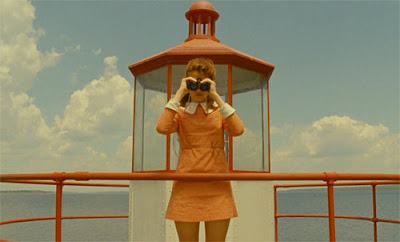Moonrise Kingdom
Directed By: Wes
Anderson
Written By: Wes
Anderson and Roman Coppola
Starring: Jared
Gilman, Kara Hayward, Edward Norton, Bruce Willis, Bill Murray, Frances
McDormand, Jason Schwartzman, Harvey Keitel, Tilda Swinton, and Bob Balaban
Director of Photography: Robert Yeoman, Editor: Andrew
Weisblum, Production Designer: Adam Stockhausen, Original Music: Alexandre
Desplat
Moonrise Kingdom, the seventh feature
from love-him-or-hate-him director Wes Anderson, feels like in many ways, a
culminating work, combining the best aspects from his previous movies. That, to
many of Anderson’s angry critics, seems impossible: the man has simply made the
same feature film over and over again (this criticism often coming from the
same people who say Martin Scorsese should stop making projects like Shutter Island and Hugo, and go back to gangster films). Yes, Moonrise is very much in that Anderson vibe, one that I’ve always
found fascinating, but never outright loved. But there’s something so assured,
and so confident in Anderson’s storytelling here, that Moonrise Kingdom is a blast, one I fell in love with from the first
image to the fighting-tears-from-my-eyes last image.
The story,
set out by narrator Bob Balaban (playing island expert, weatherman, and
possibly God), takes place on an island off the Northeast coast called New
Panzance in 1965. In a series of elaborate tracking shots, we meet the Bishops,
made up of two lazy and distant parents (Bill Murray and Frances McDormand),
three young identical boys, and a rebellious teenage daughter named Suzy,
played by Kara Hayward. In each shot, Anderson reveals the next section of the
perfectly aligned house, leading to Suzy, staring out her window with large
binoculars. On the other side of the island, we meet the Khaki Scouts, led by
Scout Master Ward (Edward Norton), who declares himself a math teacher first and
a scoutmaster second, before deciding to reverse the claim. When Ward and the
scouts sit down for their breakfast, Ward notices Sam (Jared Gilman), the most unpopular
of the boys, has disappeared. Sam and Suzy are in love, and nothing can stop
them.















